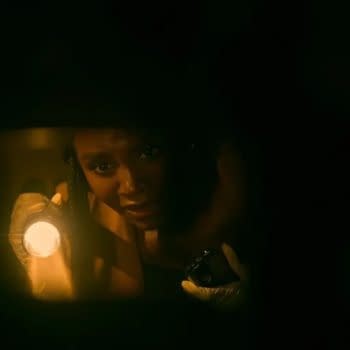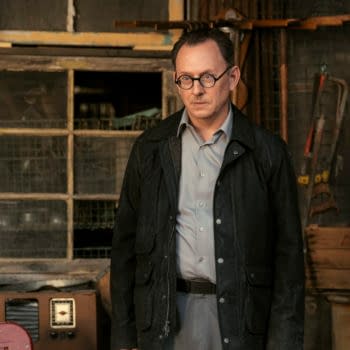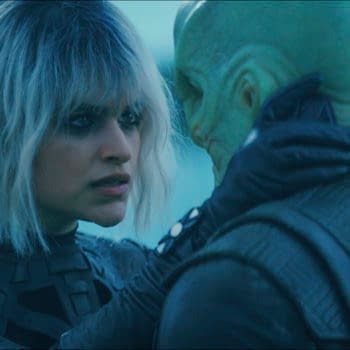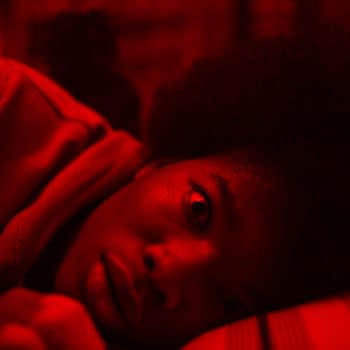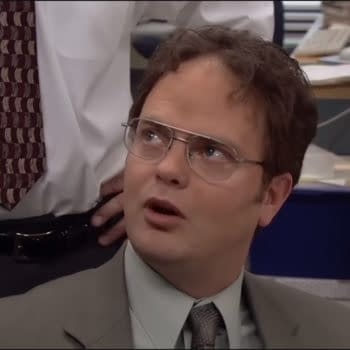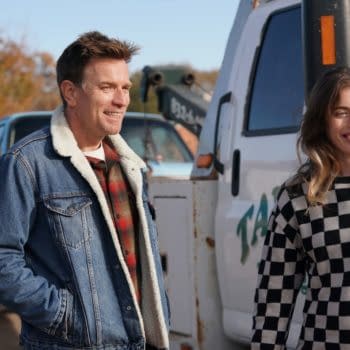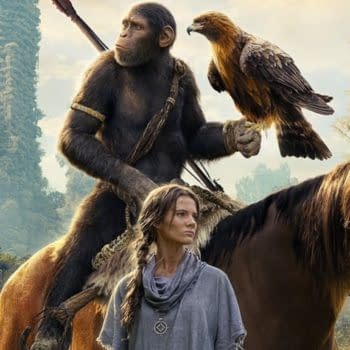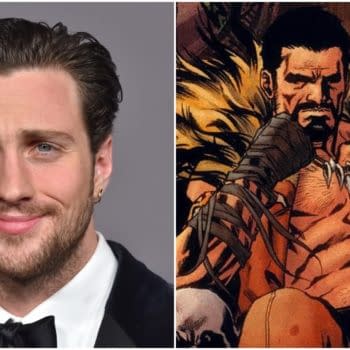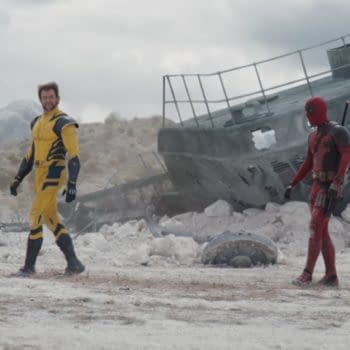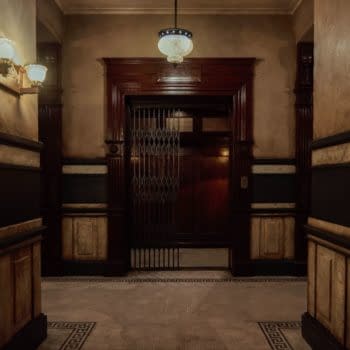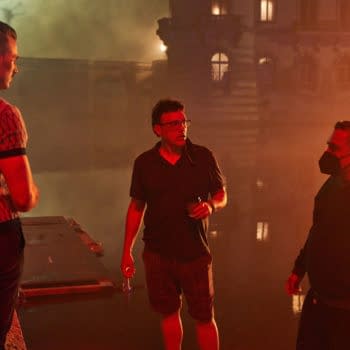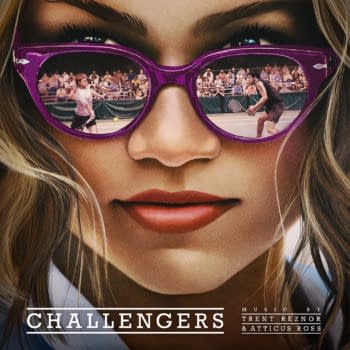Posted in: Exclusive, Hulu, IFC, Interview, Interview, Movies | Tagged: Britt Rentschler, Charlotte Ubben, exclusive, interview, Kestrin Pantera, Michael Tennant, Pretty Problems
Pretty Problems: Michael Tennant On Creative Circles, Autonomy & More
Michael Tennant (The Mirror Game) talks to Bleeding Cool about his latest romantic comedy in IFC Films Pretty Problems on Hulu.
There are plenty of self-made success stories in Hollywood because artists who are hungry enough will always look for ways to nourish themselves, as is the case of Michael Tennant, who's become his own force acting, writing, and producing. His latest project is IFC's Pretty Problems, which follows Jack (Tennant) and Lindsay (Britt Rentschler), a couple stuck in a rut professionally and in their marriage. When they are invited to wine country for a long weekend by their ultra-wealthy friends, their relationship is put to the test as it drowns in the excess of wine and wealth that Lindsay wants, and Jack is afraid of. The actor spoke to Bleeding Cool about his history with his co-writers and co-stars Rentschler and Charlotte Ubben, and how director Kestrin Pantera brought their story to life, casting, and influences.
NOTE: The interview took place before the current SAG-AFTRA strike.
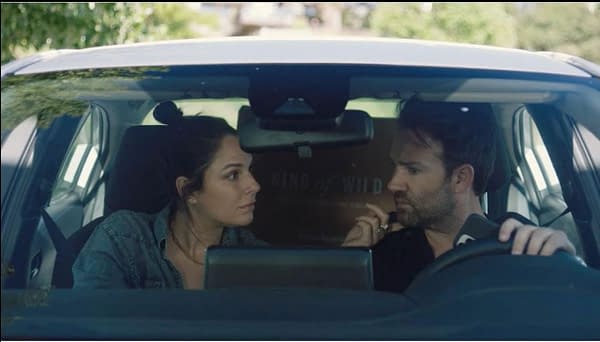
BC: What's the inspiration behind 'Pretty Problems?'
Tennant: I was having a lot of conversations with friends of mine about their relationships, and we were all in our 30s, but I've been together with our partners for a few years, and a lot of people were feeling like, "Is this it?" As an actor and producer, I was feeling a little frustrated with the work I was doing. I was fortunate to be producing some fun movies that did well, but it didn't feel like I was telling the types of stories that can turn me on. I was in Austin at SXSW, and I heard Mark Duplass give his "The Cavalry Is Coming" speech for the second time. I have one of those, "Oh my God! The Calvary isn't coming," and I keep waiting for everyone else. I keep waiting for casting directors, agents, writers, and directors to hand me this creative life that I so badly want, and no one's doing it. I saw an opportunity to take a shot at something, and I sent a lot of emails asking for favors from people and was able to throw this thing together. It was wild, and I still am shocked we were able to do it, honestly.
How did Britt and Charlotte get involved creatively?
Charlotte, Britt, and I met in acting classes years ago. Charlotte and I started a production company, RBF Productions, which she's still a part of. That's how we got into producing. I met Britt in the first acting class I took in L.A., and I immediately had a crush on her as an actor and storyteller. She was somebody who showed up every day, and she wanted to do the work, and she wanted to nerd out about it. She wanted to talk about it, and we bonded over this. You get into the industry, and you're fighting to get two lines on 'Law & Order,' and you're letting your self-worth be fixated around to book as a guest star. That's not why most people get into the industry, and Britt and I always share a lack of vanity and a real want and desire for community. That's the other part of this movie is it's about community. I still work with Britt. We're directing my next feature together in Maui next spring.
How do you break down the set the Kestrin ran?
We met Kestrin through a mutual friend, Leah McKendrick, and Kestrin had had a movie at SXSW the previous year. I thought about directing 'Pretty Problems,' but we knew we were going to be wearing a lot of hats already. We recognized early that Kestrin had a phenomenal style. Britt met Kestrin at Sundance, and she noticed her in the line for Lips, and this woman had on this white jacket in this big crazy white hat. When we got introduced to Kestrin, Britt immediately identified her. What Kestrin taught me, and she's someone who starred in her own movies, too, is being comfortable wearing the hat you need to be wearing at that moment and not worrying about…there were so many takes on set where she told me to stop tying people's shoes and just act, which was a healthy reminder for me. At the end of the day, acting is my passion, but when you're wearing all the hats, you're wrapping takes, taking lunch orders, moving cars, and you're making sure the camera gets moved around, it's easy to forget about the reason you're there, which is to embody and tell the story. She was awesome. I learned so much from her, and she's the reason I'm so excited to direct. My next feature is I want to see what I know.
Did you feel more relaxed and focused on the set without the responsibility of directing?
So much of this movie was built on trust, handshakes, and hugs. There was a level of trust I needed that the person behind the camera is going to let me know if what I'm doing is working or not versus finishing a take, and then me looking in an iPad at the footage we shot. It allows me to remove vanity. When I look at the footage, the first thing I'm going to think is, "Oh, God! My hair is messed up!" I've got that New York blood in me, the F-bombs fly. I'm going to the vain stuff instead of really concentrating on connecting with the person I'm so connecting with and worrying is my character serving a story right? If I could do 'Pretty Problems' again, I'd have three more producers on the set. We were doing a lot. We didn't get a lot of sleep. We were drinking too much caffeine and not enough water.
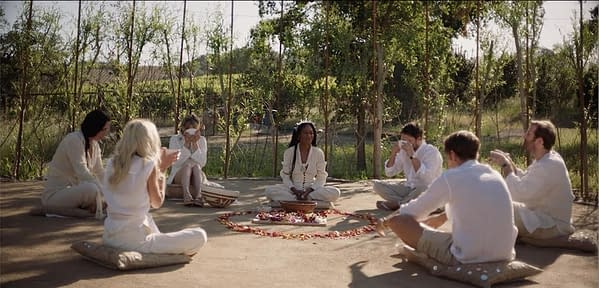
How did the casting come together, or did they mainly consist of your actor friends?
With the exception of a couple of people, we were at dinner for my birthday in 2019, and I'd written the first act of the movie. I'd had the outline done, and I talked to Charlotte about it a bunch. We were doing the thing that indie movies do: "Let's grab a couple of TV actors that are on hiatus and can come work for scale. We'll play some smaller parts in it, and that'll be that." We were sitting at dinner, and I'm sitting with Brit, Alex Klein, Clayton Froning, Graham Outerbridge, and most of the cast. I woke up the next morning, a little hungover and was like, "What if we just did this with our friends? What if we went and made something with this group of people who won't let us fall, who will support us every step of the way because we know these people?" I also know that they are incredibly talented, and most of them haven't really gotten the opportunities they deserve because this is a cutthroat history, and it's your two lines. It's hard to get your scenes and make your movie.
The only exceptions were J.J. Nolan, who plays Cat in the film. J.J. had been in acting class for probably a year, and she was amazing. We lost touch, as people do, and Kestrin brought her in to read for the part that Charlotte ended up playing. J.J. came in and just destroyed the audition to the point where Charlotte was like, "No, I'm playing that part now. I want to play that part." I was like, "We already offered J.J. this part. What do we do with J.J.?" Kestrin and I put our heads together and said, "Screw it. Let's offer J.J. this bigger role," and I'm grateful we did. She's one of my favorite parts of the film. J.J. also brought in Melissa Linden, who did all our costumes because we were going to try to costume the movie out of our own closets. Melissa is a stylist for a famous pop star and a lot of celebrities, and she loved the script. She had relationships, and she was able to call in a lot of favors for us sending Kestrin, Vanessa Chester, who plays Gigi, who was the only person I didn't know on set. She showed up at the exact right time.
We were about a week into shooting. We were all tired, and she was an espresso shot coming in so ready to rock. As I look back on this process, I was fortunate to have this group of actors to cast as I'm working on a couple of other things moving forward. I have an appreciation for casting directors. They open doors for you, and they legitimize a project. I'm working with a couple of great casting directors right now, I'm trying to work my people into some roles, but I'm trying to be open to a little more of "How big can we get with this thing?" Names attached to a movie help get in the money and drive more resources.
Was there a particular sequence, scene, or aspect of the film that was difficult?
A fun thing happened, on the third day Britt and I were shooting this tender emotional scene. It's the last scene in the movie, and we can tell something's up with the crew, but we don't know what it was. We were trying to stay there, but we could tell something was going on. We shot two cameras because we were trying to maximize coverage. We did a fair bit of improvising. I'd say 80% of what I wrote is in the movie.
We can tell something's up; we break for a second, I go around the corner, and the entire crew, like Excalibur, is trying to pull a memory card out of a camera. This memory card is jammed into this thing. We end up down a camera for about two days. In the meantime, though, my producer Katya [Alexander] called up a house in Berkeley. We got a guy to send the camera up to us. We got a friend in L.A. to get us a camera and hop on an Avelo flight. We were also at peak COVID at this point when we were post-vaccine. We had to test anybody that came on or off the set and then, quarantine them for a couple of days. He ran, flew out, masked up, dropped off the camera, and we couldn't let him on the set, because he hadn't tested.
The other big thing was when we shot all this stuff with Britt right off the bat because it was intimate. It was the two of us, and we knew coming off COVID, there was going to be a little bit of a warmup that was going to be needed for us to get into it. We shot these first three days, which were a lot of more emotional, bummer relationship aspects of the movie. I turned to Britt and Charlotte and said, "You got it. I didn't mean to write 'Marriage Story.' This is sad, and then everybody showed up, and I turned to them and said, "I didn't mean to write 'American Pie' either. I don't know what the hell we're doing here." It's a real credit to Kestrin, and editors, Alice [Airoldi] and Grant [McFadden], that they were able to thread the needle and find a lot of humor in this while also delivering a real pathos.
Did you find it difficult to balance writing and not turning it into a caricature?
It was difficult because it's fun and you are all your friends. We'd get together and shoot shorts together, and we rehearse auditions together. We all had a language already, and that was also why was so important to Britt, and I played Lindsay and Jack in the movie. We needed to be mom and dad. We needed to let everybody be a maniac. We're going to stand here and let everyone else be funny, and I'm going to be a bummer the entire time this movie is shooting, which is not fun being the P.O.V. character. I read this great interview with Paul Rudd talking about working with Will Ferrell and Melissa McCarthy a few years ago about how the hardest part of his job is not laughing. Whenever you see the outtakes like the one in This Is Forty is an all-time favorite of mine where Melissa McCarthy is off the rails. He and Leslie Mann are dying off-camera, and they're trying to keep the snickering to themselves.
It was a balance but much credit to our editing team for helping us tell the story that I intended. I'm such a huge fan of the Judd Apatow stuff, and I knew I couldn't get away with a two-and-a-half-hour-long movie, but I want to get in some feelings. My company is called My Therapist Thinks Productions, and that's my whole bit like, "I want to make stuff." They're like, "I want to make stuff that's kind of fun and thoughtful, but also is going to make you question, 'What am I doing? What I'm doing serving me in this moment?'"
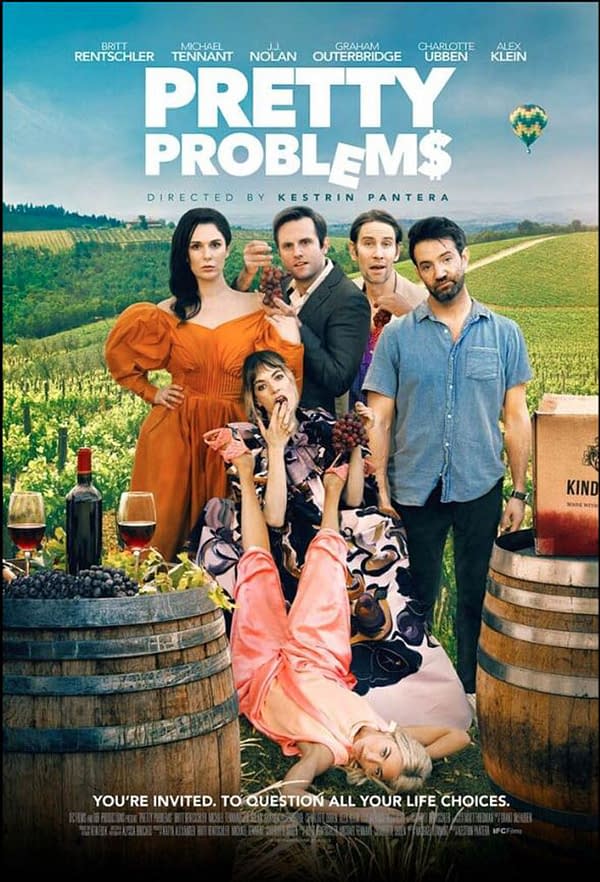
Since you brought up some names there, Ferrell, Apatow, or were there any other influences creatively?
I love anything Star Wars; just take my money! I don't care if it's good; I'm in! I'm not going to make Star Wars because that's not my kind of storytelling. It is filmmakers like Leslye Headland, but also, I grew up on films like Anchorman, Wedding Crashers, and The 40-Year-Old Virgin. A lot of these movies that you couldn't make them now. Coming in with some of that, you're watching actors play with each other, and it's fun to watch actors play each other. At the same time, my two favorite movies are Anchorman and Brokeback Mountain. Tell me what those have in common because I don't know what it is. Those are two amazing films in completely different ways. I've watched the second season of The Bear, two and a half times already. It's things like that where I like laughing, and then I like getting punched in the stomach a little bit. Joey Soloway did such a great job with their first film, Afternoon Delight. That's always one that's jumped out to me because I want to do that. That doesn't mean if Marvel or Star Wars wants me to come and swing a lightsaber or some tights, I wouldn't do it.
Pretty Problems is available on Hulu.






